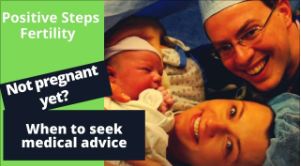How much does a “perfect lifestyle” really affect fertility? The internet and common sense disagree on this. Everywhere one turns on the internet, you are told if you just “do this” you will get pregnant. But how much can habits fix blocked tubes, fibroids, a husband with poor sperm, or DNA problems for eggs?
The most common lifestyle advice is to eat better. It’s true that, “You are what you eat.” But if this were a make or break issue, how come you can go to McDonald’s and find people eating horribly, but they are surrounded by multiple children?
Though there are rare exceptions, an unspoken truth about fertility is that the majority of causes can’t be fixed through a “perfect lifestyle.” The internet overcomplicates TTC (trying to conceive), but much of it boils down to, Does the guy make reasonable sperm, Does the woman make reasonable eggs, Can sperm and eggs meet in the fallopian tubes, and Can a resulting embryo implant in the uterus? Look at the following and think about the impact of lifestyle.
- If a woman has a healthful lifestyle, would that change a guy’s sperm?
- If the primary factor in egg quality is DNA, which is already determined by the time of a woman’s birth, how much can you truly improve egg quality?
- If fallopian tubes are blocked, has any nonsurgical intervention been shown to open them?
- Does anything outside of surgery cause permanent improvement of fibroids, polyps, septae or other uterine problems?
The limits of lifestyle changes
Though you can find people or even small papers claiming almost anything (clown therapy for pregnancy being the best example), we are not aware of any large, well designed studies showing lifestyle will meaningfully change any of these things, with two exceptions. First, if you have very irregular menses (or none), sometimes weight optimization can result in ovulation which will improve chances. (Going from 0 eggs to 1 makes a huge difference.) Second, despite some debate, smoking, alcohol and caffeine cessation probably doesn’t hurt and may help.
However, for the many women with only a 1-3 percent chance of pregnancy in a given month, even if this did help, it won’t radically change TTC odds. (This is an important post for another week- what no one says about actual chances of pregnancy, but the quick version is if you have a 1% chance per month of getting pregnant, how much will taking clomiphene to go from 1 egg to 2 eggs really change this?)
Put your hope in the right things
Though wellness should be pursued for its own sake, it is frustrating but also liberating to realize one can’t do much through lifestyle to shift fertility. (It’s also kind of necessary – a few centuries ago we had little idea how fertility worked, but our species didn’t die out from “getting it wrong.”)
The reason this matters is that if you put energy into something that doesn’t change your odds, you unnecessarily will feel let down by your body, medicine and more. Hopelessness is a natural outcome when putting one’s hope in the wrong things. Fortunately, there are ways of putting hope in the right things. (The distinction between “improving chances” and “meaningfully improving chances” will also need to be a future page.)
That is probably the most important takeaway from all of those “Common sense and evidence” posts –fertility can be lonely, but with millions going through the same thing, no one needs to be alone. Beyond FB and other communities, there is Resolve, ASRM, (hopefully this site) and other sources that can provide reasonable perspective, as well as some doctors more reliable than Dr. Google.
Finally, with the presumption that many reading this are on the TTC journey, for those making it to the other side, pay it forward. Share your story with others. So much wisdom is collected along the way that would make a world of difference to someone just starting out, and hopefully, their journey is faster and easier for it.
Problems getting pregnant
Are you having troubles getting pregnant? Learn about the basics of conception and some of the factors that can contribute to both female and male infertility.



